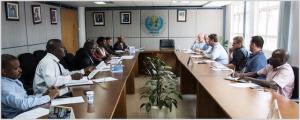WHO to strengthen partnership with CDC
The World Health Organization Country Office in Uganda and the Centre for Disease Control (CDC) convened to discuss the proposed CDC-WHO Cooperative Agreement (CoAg) on Health information architecture and interoperable standards for public health surveillance of Ebola and other highly infectious diseases. The meeting took place at the WHO country office in Uganda.
In attendance from WHO, were the WHO Representative in Uganda, Dr. Wondimagegnehu Alemu and his technical officers while the CDC team comprised of Dr. Steven Wiersma (Country Director, CDC Uganda), Mr. Jeff Borchert, (Global Health Security Acting Director, CDC Uganda), Mr. Dan Tuten (CDC Atlanta) and Mr. Ray Ransom the Associate Director of Informatics, CDC Atlanta.
The purpose of the CoAg is to improve national core data analytics and public health response capacities in accordance with International Health Regulations (IHR) through strengthening routine surveillance information systems, outbreak response systems, and patient‐level health information systems through appropriate use of ICTs and interoperable standards along with adequate health workforce capacity building in selected countries.
The key outcomes are guidance documents, tools and strengthened country capacity related to national and sub-national health information architecture, including collection, analysis and reporting of routine disease surveillance data for all notifiable health conditions in accordance with IHR. In the meeting, the CDC team was briefed about the work of WHO in Uganda pertaining laboratory strengthening, Integrated Disease Surveillance and Response (IDSR) and the Electronic Health Information Management System (eHMIS).
It was noted that WHO has technically supported the Ministry of Health (MoH) to design and adapt IDSR training materials to the country context and ensured that refresher training is conducted in all districts of Uganda. Furthermore, the team pointed out that weekly surveillance was expanded to include other conditions of importance like malaria, maternal and perinatal deaths.
Integrated training targeting all health workers for IDSR, eHMIS, Maternal and perinatal death surveillance was also conducted.
WHO has also supported MoH to strengthen the diagnostic capacity and networking of diagnostic facilities within the country. This implies that laboratories are able to offer timely diagnosis of diseases of public health importance.
WHO also supports MoH to monitor progress through analysis and feedback and enforce accountability on poorly performing districts by engaging top management at MOH and the leadership at district level.
The CDC team was also informed of the WHO support to MoH to build districts capacity on using the updated weekly reporting form HMIS033b, functional integration of mTrac and DHIS2 and improvement in the reporting rates which currently stands at 79% for Week 32
The CDC team drew attention to WHO-CDC partnership and indicated that WHO is well positioned as the lead technical health agency of the United Nations to support government on disease surveillance. The first phase of the project will focus on observation and documentation of the country situation. WHO and CDC will hold further discussions with MoH on the approach to this activity.
______________________________________________
For more information, please contact:
Mwebembezi Edmond, Public Information Officer, Tel. +256 414 335569, Cell: +256 782 962674, Email:mwebembezie [at] who.int (mwebembezie[at]who[dot]int)



